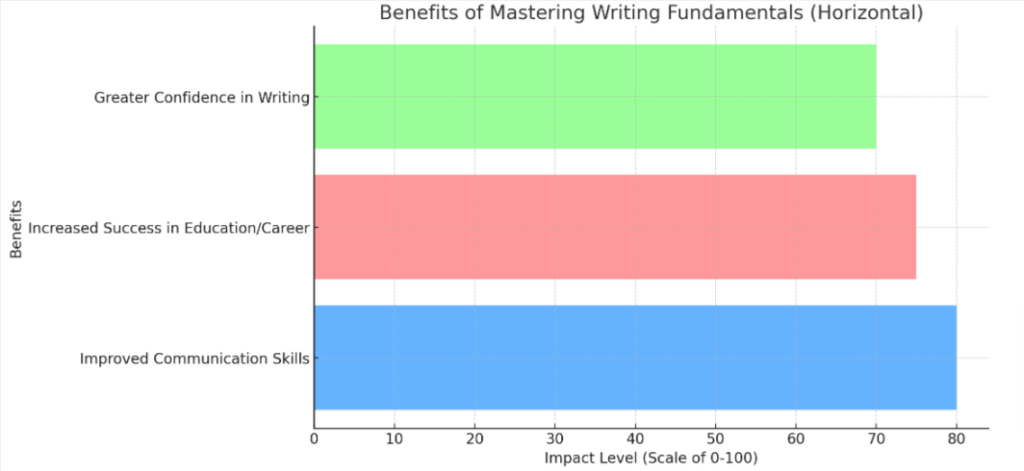The Elements Of Style: Writing Fundamentals Every Writer Should Know
Struggling to capture your thoughts in writing? You’re not alone, as many find it challenging to effectively convey their ideas on paper. Interestingly, great writing isn’t about big words or complex sentences but mastering the fundamentals of style.
This article will guide you through key elements like grammar rules, word choice and structural design that can transform your writing from mundane to masterful. Ready for a style makeover? Let’s dive in!
Key Takeaways
- Mastering the fundamentals of writing style, such as grammar rules and clarity in expression, can transform your writing from mundane to masterful.
- Good writing is essential for establishing a strong connection with readers, effectively conveying ideas, and building credibility.
- The elements of writing style include grammar and punctuation, clarity and conciseness, voice and tone, word choice, and structure and organization.
- Mastering writing fundamentals brings benefits such as improved communication skills, increased chances of success in education and career, and greater confidence in writing.
The Importance of Good Writing
Good writing is essential for establishing a strong connection with readers, effectively conveying ideas, and building credibility.
Establishing a connection with the reader
Building a rapport with your audience forms the backbone of effective writing. The reader’s engagement depends on how well you, as a writer, can speak directly to their interests, needs, and aspirations.
Think of it like having an intimate conversation – you would naturally lean into topics that resonate with the person you’re speaking to. When writing, weave in anecdotes or real-world examples that make your content relatable and humanize your voice.
This fosters empathy and makes readers feel understood and valued by keeping them hooked from start to finish.
Conveying ideas clearly and effectively
Mastering the art of conveying ideas clearly and effectively is a crucial aspect of writing fundamentals. This involves selecting appropriate words, structuring sentences efficiently, and ensuring coherence throughout the piece.
The goal is to facilitate comprehension for the reader, allowing them to grasp your point without excessive re-reading or guesswork.
Clear communication hinges on brevity and straightforwardness. Avoid overcomplicated sentence structures or obscure jargon that might confuse readers. Instead, opt for plain English style whenever possible – it’s not about diluting the content but rather making it universally accessible without losing its essence.
Building credibility and trust
Building credibility and trust is a highpoint of any successful writing. It’s about persuading your readers that you’re reliable, know your stuff, and not just randomly throwing words together.
Honesty goes a long way in establishing this aspect of writing. Using plain English style displays authenticity and can be instrumental in building the kind of trust that keeps readers engaged.
Notable too is using structural design in your writings; deviating from it could hurt how much faith readers put into your work. Don’t disregard grammar rules or punctuation either: these show competence, increasing reader confidence in what they read from you.
Your voice must consistently reflect expertise but also warmth—this makes for an enjoyable read while showing you as capable, further fostering credibility among readers.
Elements of Writing Style
The elements of writing style include grammar and punctuation, clarity and conciseness, voice and tone, word choice, and structure and organization.
Grammar and punctuation
Understanding and applying proper grammar and punctuation is essential for effective writing. Accurate use of these elements helps to convey ideas clearly, ensuring that the message is understood by the reader.
By following grammar rules and using correct punctuation, writers can enhance their credibility and professionalism in their work. Grammar guides us in constructing sentences with proper subject-verb agreement, while punctuation adds clarity and coherence to our writing.
Mastering these fundamentals enables writers to communicate effectively and engage readers more efficiently, resulting in a polished piece of written work.
Clarity and conciseness
Clarity and conciseness are essential elements of effective writing. When your writing is clear, it allows the reader to easily understand and follow your ideas. This can be achieved by using simple and straightforward language, avoiding excessive jargon or technical terms that may confuse the reader.
Additionally, conciseness involves expressing your ideas in a concise manner without unnecessary repetition or wordiness. By being concise, you ensure that your writing is focused and to the point, making it easier for the reader to grasp your main message.
Striving for clarity and conciseness in your writing will greatly improve its impact and effectiveness.
Voice and tone
Your voice and tone are essential elements in writing that can greatly impact how your message is received by readers. Voice refers to the personality and style of your writing, while tone sets the mood or attitude conveyed through your words.
By carefully choosing your voice and tone, you can create a connection with your reader, establish credibility, and effectively communicate ideas. It’s important to find the right balance between being conversational and professional, using suitable language and maintaining clarity throughout your piece.
Word choice
Choosing the right words is essential in writing. The words you use can greatly impact how your message is received by readers. By selecting appropriate and precise words, you can effectively convey your ideas and evoke the desired emotions.
It’s important to consider the meaning, connotation, and tone of each word to ensure clarity and coherence in your writing. Additionally, using varied vocabulary helps to keep readers engaged and interested.
So take the time to carefully select your words, as they play a crucial role in creating a powerful and impactful piece of writing.
Structure and organization
Good writing requires careful structure and organization. By arranging your ideas in a logical and coherent manner, you can effectively convey your message to the reader. A well-structured piece of writing is easy to follow, making it more engaging and enjoyable to read.
It allows the reader to understand your main points clearly and helps them navigate through your thoughts effortlessly. When writing, consider using headings, subheadings, and paragraphs to break up your content into manageable chunks.
This will make it easier for readers to digest the information and find what they need quickly. Clear structure and organization are essential elements of good writing that contribute to effective communication with your audience.
Benefits of Mastering Writing Fundamentals
Mastering writing fundamentals brings numerous benefits, such as improved communication skills, increased chances of success in education and career, and greater confidence in writing.
Improved communication skills
Improving your writing skills can have a significant impact on your communication abilities. By mastering the fundamentals of writing, such as grammar rules, sentence structure, and clarity in expression, you will be able to convey your thoughts more effectively.
This enhanced communication skill will not only benefit your personal relationships but also make you more persuasive and influential in professional settings. So take the time to refine your writing skills and watch how it enhances your overall ability to communicate with others.
Increased chances of success in education and career
Good writing skills are crucial for success in both education and career. When you have a strong command of grammar, punctuation, and sentence structure, you can effectively convey your ideas to others.
This clarity and coherence in writing not only helps you excel academically but also gives you an edge in the professional world. Employers value employees who can communicate their thoughts clearly and concisely, which is why mastering writing fundamentals can significantly increase your chances of achieving success in education and career.
So don’t underestimate the power of good writing – it can open doors of opportunities for you!
Greater confidence in writing
Mastering the fundamentals of writing can lead to greater confidence in your abilities as a writer. When you have a strong grasp of grammar, punctuation, and sentence structure, you feel more assured in your ability to communicate effectively.
Additionally, understanding how to craft clear and concise sentences helps you express your ideas with clarity and coherence. As your writing skills improve, you gain confidence in your ability to engage readers and convey your message with impact.
With practice and experience, you can become a more confident writer capable of producing compelling content that resonates with your audience.

Tips for Improving Writing Skills
To improve your writing skills, read and analyze well-written works. Practice writing regularly and seek feedback from others. Stay updated on grammar and style rules, and if needed, seek professional guidance.
By continuously honing your craft, you can become a confident and skilled writer.
Read and analyze well-written works
Reading and analyzing well-written works helps improve your writing skills. It exposes you to different writing styles and techniques, allowing you to learn from successful writers. By studying their works, you can identify effective ways of expressing ideas and achieving clarity and coherence in your own writing. Reading also helps expand your vocabulary and develop a deeper understanding of grammar rules and sentence structure.
Moreover, it inspires creativity and encourages you to experiment with different writing strategies. So grab a book or find articles online, and immerse yourself in the world of great writing!
Practice writing regularly
Practice writing regularly is crucial for improving your writing skills. It allows you to develop a strong command of grammar, punctuation, and sentence structure. It also helps you to refine your style and voice as a writer. Regular practice enables you to experiment with different techniques and learn from your mistakes.
By dedicating time to writing on a consistent basis, you will gradually become more proficient and confident in your ability to communicate effectively through the written word. So make it a habit to practice writing regularly, whether through journaling, blogging, or any other form of creative expression.
Get feedback from others
Seeking feedback from others is an essential step in improving your writing skills. It allows you to gain different perspectives and identify areas for improvement. Here are some tips on how to get valuable feedback:
- Share your work with trusted friends, family, or colleagues who have a good understanding of writing.
- Join a writing group or workshop where you can receive feedback from fellow writers.
- Consider hiring a professional editor or proofreader to provide constructive criticism.
- Take advantage of online platforms and forums dedicated to writers, where you can share your work and receive feedback from a wider audience.
- Be open – minded and receptive to constructive criticism, as it can help you learn and grow as a writer.
Stay updated on grammar and style rules
Stay up to date with the latest grammar and style rules by:
- Reading books and articles on writing that cover grammar and style guidelines.
- Following reputable websites, blogs, or social media accounts dedicated to providing updates on language usage.
- Subscribing to newsletters or email lists that send regular tips and reminders about grammar and style.
- Participating in workshops or online courses focused on writing skills and style guidelines.
- Utilizing grammar and style checkers available in word processing software or online tools to catch mistakes and offer suggestions for improvements.
- Engaging in discussions with fellow writers or joining writing groups where members can exchange advice and knowledge about grammar and style rules.
- Referencing trusted reference materials such as grammar guides, style manuals, or editing handbooks when unsure about specific rules.

Seek professional guidance if needed
If you find that improving your writing skills is challenging, don’t hesitate to seek professional guidance. Writing is a skill that can be honed with practice and feedback from experts in the field.
Whether it’s for grammar and punctuation help, clarity and coherence in writing, or style advice, seeking professional guidance can provide valuable insights and support to enhance your writing abilities.
With the assistance of a professional, you can gain confidence in your written communication and take your writing to new heights.
Conclusion
In conclusion, mastering the elements of style and writing fundamentals is essential for every writer. By understanding grammar rules, clarity in writing, and effective structural design, writers can enhance their communication skills, boost their chances of success in education and careers, and gain greater confidence in their writing abilities.
So keep practicing, seeking feedback, and staying updated on language conventions to become an honest and skilled writer who connects with readers through clear and impactful prose.

